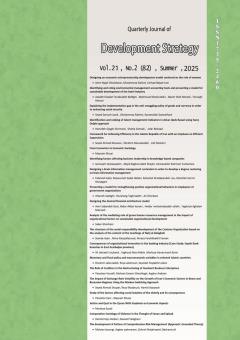Explaining the implementation gap in the anti-smuggling policy of goods and currency in order to enhancing social security
Subject Areas : اقتصادی
SEYEED dariush javid
1
,
Gholamreza Rahimi
2
,
Karamolah Daneshfard
3
![]()
1 - Ph.D. Candidate in Public Administration, Faculty of Management and Economics, Science and Research Branch, Islamic Azad University, Tehran, Iran.
2 - Assistant Professor, Department of Public Administration, Faculty of Humanities, Bonab Branch, Islamic Azad University, Bonab, Iran (Corresponding Author). Email: rahimigholamreza@srbiau.ac.ir
3 - Professor, Department of Public Administration, Faculty of Management and Economics, Science and Research Branch, Islamic Azad University, Tehran, Iran
Keywords: social security, social order, policy implementation, gap implementation, prevention of goods and currency smuggling poli.,
Abstract :
Background and objective: The smuggling of goods and currency represents one of the most significant obstacles to ensuring social security, imposing profound and detrimental consequences on society. Extensive evidence suggests that the policy aimed at combating the smuggling of goods and currency in Iran has failed to achieve its intended objectives following its adoption. Acknowledging the complexity inherent in policy implementation, the present study seeks to investigate the implementation gap in the anti-smuggling policy with the aim of enhancing social security. Methodology: This study adopts a qualitative approach within an interpretive paradigm, utilizing thematic analysis as the strategy for data analysis. Data were collected through semi-structured interviews with seventeen policy implementers, who were purposefully selected, and interviews continued until data saturation was achieved. To ensure the validity of the research model, two strategies were employed: external audit and triangulation. Findings and results: The findings of this study revealed six main themes and fourteen organizing themes that contribute to the implementation gap in anti-smuggling policies of goods and currency. These include: institutional capacity weaknesses (organizational independence, judicial system inefficiencies, administrative corruption); resource shortages (control equipment, human resource limitations); process inconsistency and lack of integration (unclear process definitions, poor information coherence, fragmented system performance); planning deficiencies (tariff setting, structural weaknesses in policy); and oversight shortcomings (inadequate monitoring of cargo movement, neglect of border control). The results indicate that the implementation of such policies is a complex phenomenon, and the resulting gap has harmful consequences for the country—often overlooked by policymakers. Therefore, revisiting and reforming the policy implementation process is essential to enhancing social security.
